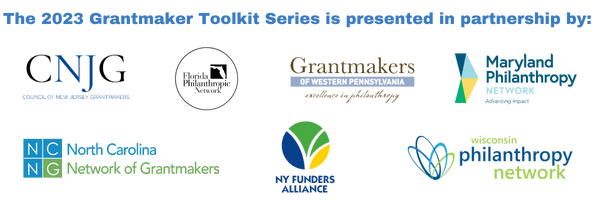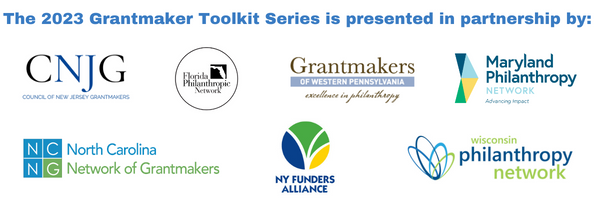Site Search
- resource provided by the Forum Network Knowledgebase.
Search Tip: Search with " " to find exact matches.
The Healthcare Foundation of New Jersey (HFNJ) has awarded $1,219,591 to 12 New Jersey non-profit organizations in the first quarter of 2022.
All awards given this cycle were in support of new projects, and many awards were given to organizations receiving their first-ever grant from HFNJ. The largest grant of this cycle, a $500,000 gift to Morristown Medical Center, will help the hospital fund an ambitious renovation of its pediatric emergency department, doubling space available for children facing behavioral health crises.
Many grants this cycle embody a “win-win” approach to ameliorating multiple social problems with one project. For instance, a $160,000 grant to Youth Build Newark will allow the group to create a post-secondary career track to healthcare professions for Newark-area youth currently disconnected from school or employment. The project will both help the young people gain a foothold to promising career paths, and help fill regional staffing shortages in the healthcare industry. Likewise, a $50,000 grant to support Newark’s Working Kitchens project will both feed hungry families, and help ensure that restaurants that have seen downturns in business due to the pandemic can continue to remain solvent.
“HFNJ is pleased to end our first quarter of funding in 2022 by providing over $1.2M in funding for critical projects that will support residents in the greater Newark area, especially grants that will help train the next generation of healthcare workers, who are in short supply and are vitally needed as communities recover from the pandemic,” said Michael Schmidt, Executive Director and CEO of the Healthcare Foundation of New Jersey.
The National Telecommunications and Information Administration, New Jersey Board of Public Utilities, Office of Broadband Connectivity, and New Jersey League of Municipalities invite you to the Internet for All: New Jersey Local Coordination Workshop in New Brunswick, New Jersey.
This day long workshop will bring together critical partners in New Jersey from the federal, state, and local governments, industry, and other key collaborators to discuss coordination on broadband efforts as the state prepares to receive significant broadband funds from the Infrastructure Investment and Jobs Act.
Connecting all people in New Jersey to affordable, reliable high-speed internet is critical to our economic stability and this event will provide an opportunity for us to discuss ways we can work together to efficiently and effectively utilize these federal dollars to the maximum extent.
Proposed agenda items include:
- State Update on Implementation of Federal Broadband Programs
- Coordination on Infrastructure Expansion
- Strategies for Broadband Infrastructure Development
- Telehealth
- Input on 5-Year and Digital Equity Plans
- Digital Access Challenges and Solutions for New Jersey
- Think Locally, Plan Regionally
- Workforce Strategy Panel
- Office Hours with NJ Office of Broadband Connectivity and NTIA
Cost: Free for Members and Non Members
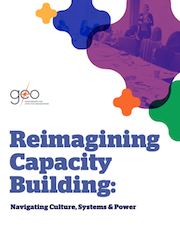
Six million immigrants in the US have jobs that could increase their risk of contracting the virus -- from physicians and home health aides to agriculture and food production workers. Another 6 million work in areas that have suffered major financial loss, including the restaurant and hospitality industry, in-home childcare, agriculture, and building services.
Yet, documented and undocumented immigrants are ineligible for federal relief funds and government-sponsored safety-net programs. Many “essential” workers lack health insurance. Language barriers often make getting services difficult. And, fear of repercussion if they test positive for COVID or uncertainty around immigrant policies prevent many immigrants from even seeking assistance.
During this webinar briefing, we will hear from Abel Rodriguez, Director for the Center on Immigration and Assistant Professor of Religion, Law, and Social Justice at Cabrini University and Sara Cullinane, Director of Make the Road New Jersey.
Topics will include:
• How immigrants and their families have been impacted by COVID, nationally and in our state.
• Supporting immigration policies and programs that advance the social and economic well-being of immigrant populations.
• Efforts in New Jersey communities to provide direct support, education, and other needed resources to immigrants during the pandemic.
Nearly 1 in 4 New Jersey residents is an immigrant. And despite their vital importance to this state and our country’s culture and economy, immigrants are often left out of programs and denied services that are critical for recovery. Join us for an important briefing on why your organization’s response to COVID must uplift immigrants and their families – now and for the future.
Cost: Free for CNJG Grantmakers. $50 for Non Member Grantmakers
Webinar Video
This one-hour webinar will offer a high-level overview of employment law trends and best practices for foundations. Attorneys from the Labor & Employment and Nonprofit & Tax-Exempt Organizations groups of Dentons, the world’s largest global law firm, will present practical tips for small and mid-size foundations with regard to employment and workplace issues. Drawing from both national trends in the industry and the impact of the pandemic and social change, topics will include:
- social media policies;
- remote and hybrid work considerations;
- job descriptions and changes with hiring practices; and
- independent contractor agreements.
Our speakers will hold time for Q&A at the end of the presentation. As part of the registration process, attendees may also submit questions or topic area suggestions for our speakers to address if time allows.
Speakers
Carsen Ruperto, Counsel, Dentons Cohen & Grigsby
Hayley Haldeman, Counsel, Dentons, Cohen & Grigsby
This program is for members of the following philanthropy-serving organizations: Maryland Philanthropy Network, Council of New Jersey Grantmakers, Florida Philanthropic Network, Grantmakers of Western Pennsylvania, Philanthropy Wisconsin, NY Funders Alliance, and North Carolina Grantmakers.
This resource guide includes various virtual volunteer opportunities, additional resources, and best practices for corporate volunteer programs during the coronavirus pandemic.
This resource will be updated, as CNJG and corporate members collect new information and opportunities to share with colleagues.
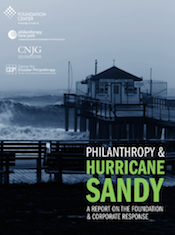
This new report from CNJG and partners examines the response of foundations, corporations, and other institutional donors to the devastation wrought by Hurricane Sandy in October 2012. Numbering nearly 600, these funders have so far committed more than $380 million for relief, recovery and building efforts. The hard data and reflective observations in the report contribute to the growing body of knowledge that helps foundations and corporations be strategic and effective with their giving when disaster strikes.
Two years after the historic storm, Philanthropy & Hurricane Sandy: A Report on the Foundation & Corporate Response breaks down the allocation of dollars contributed thus far and offers perspective on the role of private giving in disaster response and lessons to be taken from this one. The report was published by the Foundation Center in partnership with the Council of New Jersey Grantmakers and Philanthropy New York, and with support from the Center for Disaster Philanthropy.
“Throughout the past two years, our exceptional nonprofit and funder community has taken on challenges they never imagined,” said Nina Stack, president of the Council of New Jersey Grantmakers. “These organizations continue to develop innovative solutions that other communities will learn from and build upon in future disasters.”
In addition to the report’s numerous funders, CNJG wishes to thank the PSEG Foundation for supporting this project.
This weekly conference call series welcomed New Jersey-based grantmakers along with national funders and provided an opportunity for grantmakers to hear from a wide range of experts in the field of disaster philanthropy. This series started on November 5, 2012, one week after Sandy struck New Jersey, and continued through March 25, 2013. The written summaries of each recording are listed below.
This weekly conference call series welcomed New Jersey-based grantmakers along with national funders and provided an opportunity for grantmakers to hear from a wide range of experts in the field of disaster philanthropy. Series 1 started on November 5, 2012, one week after Sandy struck New Jersey, and continued through March 25, 2013. Series 2 started on September 9, 2013 and concluded on November 4, 2013. The written compendium of the recordings is listed below.
Government-Nonprofit Contracting Reform
The Office of Management and Budget (OMB) Uniform Guidance is the biggest change in government grant guidelines in over 30 years. The rules require that federal grants and contracts—including those that pass through state and local governments—include a “reasonable amount” for indirect costs. A “reasonable amount”, according to the guidance, is at least 10 percent of direct costs and, in some cases, nonprofits can negotiate a higher amount.
With the nonprofit sector earning nearly 33 percent of its revenue from government grants and contracts, this new requirement is a game changer. Nina Stack wrote a piece discussing these changes for the Geraldine R. Dodge Foundation blog:
Excerpt from A Social Sector Game Changer:
“Nonprofits that are hired by the government to perform a service and paid through federal dollars are to use at least 10 percent of the direct costs of their grant or contract to pay indirect costs. BOOM! Just as John Madden would say. A mandate for funding that can be used for core operations. Never before has there been such a clear directive and recognition from the federal government.”
To see this change however, industry-wide advocacy is essential to ensure that all nonprofits are aware of this monumental shift and that governments follow the new requirement. Without advocacy, it is very possible that, despite the requirement to add an additional 10 percent or more to pay for indirect costs, legislative bodies at the federal, state and city levels may further reduce project budgets to keep them flat. And this could mean that in order to maintain the same level of services, nonprofits will seek additional resources from the philanthropic sector to make up the difference. Therefore it is imperative that philanthropy remains active in the conversation between nonprofits and government to continue to maintain a balance in the critical services provided by all.
What this means for nonprofits:
- Government contracts are now required to reimburse nonprofits for reasonable indirect costs (administrative, “overhead”) as part of their service-delivery agreement.
- The OMB Uniform Guidance is only a promise of better treatment—nonprofits should know the rules and protect themselves.
What this means for foundations:
- Advocacy is needed! To ensure government partners do not underfund nonprofits due to the new rules, foundations need to help spread awareness and enforce the regulations.
In New Jersey, the New Jersey Center for Nonprofits has been teeing up advocacy, information sessions, and other assistance to help non-profits take advantage of the new rules. For questions and information about the new guidelines, please visit the resources below.
Resources
Federal Register: OMB Uniform Guidance
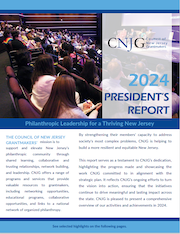
CNJG's President's Reports
This one-hour webinar will offer a high-level overview of recent trends and best practices for foundation governance. Attorneys from the Nonprofit and Tax-Exempt Organizations group of Dentons, the world’s largest global law firm, will present practical tips for governance and legal compliance, focused on small to mid-size foundations. Drawing from both national trends in the industry and the impact of the pandemic and social change, topics will include:
- Considerations for revising bylaws and conflict of interest policies;
- Foundation political activity, including lobbying and advocacy;
- Issues to consider when funding a project with a fiscal sponsor; and
- Updating grant agreements.
Speakers
| Jeffrey Fromknecht Counsel Dentons Cohen & Grigsby |
Hayley Haldeman Counsel Dentons Cohen & Grigsby |
This program is for members of the following philanthropy-serving organizations: Maryland Philanthropy Network, Council of New Jersey Grantmakers, Florida Philanthropic Network, Grantmakers of Western Pennsylvania, Philanthropy Wisconsin, NY Funders Alliance, and North Carolina Grantmakers.
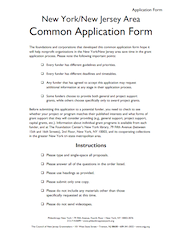
In 2001, the Schumann Fund for New Jersey and 10 private and corporate foundations agreed to collaborate on the multi-year Newark Lighthouse Initiative. The Initiative, led by two state nonprofit partners, the Association for Children of New Jersey and New Jersey Community Capital, had program and policy goals: to help three Newark-based early childhood programs move from good to exemplary, and to identify policy changes that would be necessary to enable other early-childhood programs to engage in similar efforts.
Funders over the initiative’s six-year life included the Geraldine R. Dodge Foundation, Schumann Fund for New Jersey, Prudential Foundation, Lucent Technologies Foundation, Bank of America, Grable Foundation, Sagner Family Fund, Victoria Foundation, Toys “R” Us Children’s Fund, Healthcare Foundation of New Jersey, BEA Foundation, United Way of Essex and West Hudson, MCJ Foundation, and Rosie’s For All Kids Foundation. Many funders agreed to make multi-year grants or to consider proposals for renewal of support over the life of the project.
The money was used first to support a needs assessment for each center, and then to help the centers attract and retain the most qualified teachers, implement the best teaching methods, and obtain or renovate to improve facilities. A portion of the funds was set aside for an independent evaluation of the initiative. The three centers chosen – Friendly Fuld Neighborhood Child Care, Ironbound Children’s Center, and Vailsburg Child Development Center – already had strong programs and recognized leadership. The funders believed that the extra support would enable them to improve the quality of their programs, serve as exemplars for other programs in the city, and provide teachers and parents tangible evidence of what quality looks like.
The Schumann Fund participated in the collaborative for a number of reasons. First, we understood the value of high-quality early-childhood education to children’s later success in school and in the workforce. We knew that many of the community-based programs in Newark had been operating for years with insufficient resources. We viewed the Abbott decision, which requires that the state’s 31 poorest school districts make “high-quality, well-planned preschool” available to every three-and four-year-old in those districts, as an opportunity to expand access to preschool and improve it significantly. We recognized that our investment in quality improvement could be sustained by the operating funds that the state and districts were providing to the preschool programs.
Second, each collaborating funder brought different strengths: knowledge of early-childhood policy and evaluation, expertise in community economic development, and long-term commitment to community service organizations in Newark. Third, we believed that by working together, we could more effectively use our finite resources. We could make it possible for grantees to focus on quality improvement rather than raising monies from separate funders. Participating grantmakers helped to develop the project’s framework and encouraged their colleagues to consider supporting it. Finally, we believed that by modeling collaboration among ourselves, we could encourage greater collaboration among our grantees.
There were challenges, of course. Each grantmaker had different guidelines, reporting requirements, and timetables and processes for reviewing proposals. Some were able to make multi-year grants; others were not. Several changed their guidelines or operating approach during the course of the project and were not able to continue funding it for the entire six years. During its initial phase, some elements of the original proposal changed, including the evaluation process and timeline. It took longer for the project to get off the ground than we originally anticipated. But ultimately, the trust that was established between all of the involved parties enabled us to approve the changes in the operations and timeline.
The Lighthouse project achieved its original goals of supporting quality improvements in all of the participating programs. The Association for Children of New Jersey and New Jersey Community Capital provided excellent technical assistance and planning support and identified obstacles to quality improvement that needed to be addressed through policy advocacy. In addition, the directors of two of the three programs have become effective leaders in Newark’s early-childhood community, and have presented their experiences with this project to national audiences.
This effort required us to commit time and expertise, in addition to money. It takes more effort to collaborate than it does to work in our conventional way, but it is worth it. We came away with a new appreciation for the work of our grantees; an understanding of the need for flexibility amid changing conditions on the ground; and the satisfaction – backed up by a dynamic evaluation – that our efforts contributed to tangible improvements in life-opportunities for the children and families that the centers serve.
Would we do it again? We are. This year, several New Jersey funders joined with six nonprofits, including three community organizing groups, to respond to a national request for proposal for support of education organizing. We were awarded the grant, the only statewide effort of the four that were awarded. We anticipate that the effort will engage parents and community members in local and statewide efforts to improve schools. And, we have brought national attention and national money to our work.


